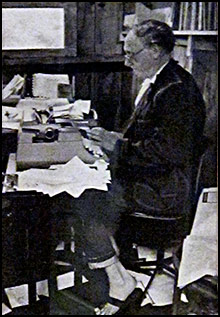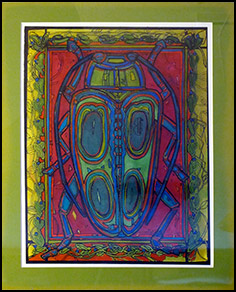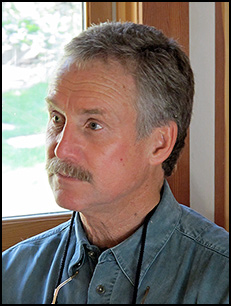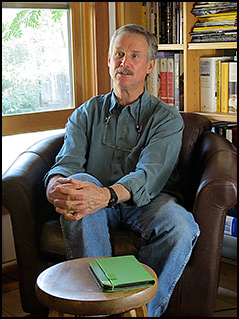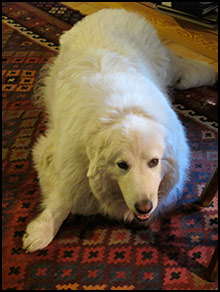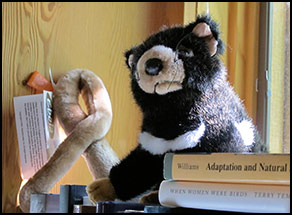
Exotic croc
Brilliant beetle

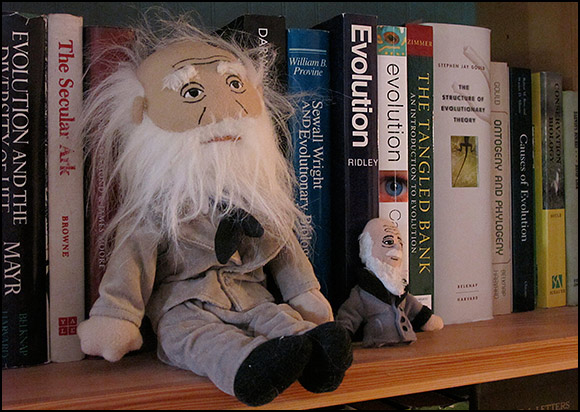
Quammen is an expert on the life of Darwin and has won awards for his own writing on evolution.
David Quammen: Science Writer, Novelist
“A real creative nonfiction writer is like a mosaic artist working with many, many very hard little colored tiles, each of which is unitary and solid. And those are the facts. . . Creative nonfiction implies a certain artfulness (in putting those tiles together), it doesn’t imply liberties taken with factual material. ”
Interview Movie
(Embedded version below)
Audio File
(Note: To download the podcast,
right click on the link if you are on a PC,
or control click if you are on a Mac. )
|
Location: |
Bozeman, MT |
|
|
Run Time: |
35:29 |
|
|
Genre: |
Nonfiction, Journalism, Fiction |
|
|
Website: |
||
|
Raised: |
Cincinnati, Ohio |
|
|
Youthful Influence: |
Jesuit high school English teachers who encouraged him, and taught him discipline and focus. Robert Penn Warren and William F. Buckley who were generous and literate mentors. |
|
|
Favorite Authors: |
In youth, Andre Norton, Arthur Conan Doyle, Robert Service, Poe. Later, Faulkner. |
|
|
Creative Habit: |
"Deplorably disciplined." His morning starts in his writing office. He reads to wake up his mind while he sips coffee and nibbles prunes. Then he reviews and revises his writing from the day before. After taking a break he writes new pages. |
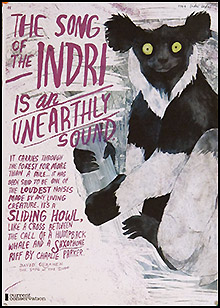
A quote from "Song of the Dodo"
Books
Nonfiction
The Song of the Dodo (1996)
Monster of God (2004)
The Reluctant Mr. Darwin titled The Kiwi's Egg in Britain (2006)
Spillover (2012)
Essays
Natural Acts (1985)
The Flight of the Iguana (1988)
Wild Thoughts from Wild Places (1999)
The Boilerplate Rhino (2001)
Fiction
To Walk the Line (1970)
The Zolta Configuration (1983)
The Soul of Viktor Tronko (1987)
Blood Line (1988)
Edited
On the Origin of Species (The Illustrated Edition) by Charles Darwin (2008)
The Best American Science and Nature Writing (2000)
Edited with Burkhard Bilger
His articles have appeared in National Geographic, Rolling Stone, Harpers, Outside, The New York Times and more.
Awards
Rhodes Scholarship (1970)
Lannan Foundation Fellowship (1997)
National Magazine Award (1987), (1994), (2005)
New York Public Library's Helen Bernstein Book Award for Excellence in Journalism (1997)
Academy Award in Literature from the American Academy of Arts and Letters (1996)
Guggenheim Fellowship (1988)
BP Natural World Book Prize (Great Britain) (1996)
John Burroughs Medal for Nature Writing (1997)
PEN/Spielvogel-Diamonstein Award for the Art of the Essay for The Boilerplate Rhino (2001)
Honorary Doctorate from Montana State University (2000) and Colorado College (2009)
The Stephen Jay Gould Prize from the Society for the Study of Evolution (2012)
We think you'll enjoy the warmth of the conversation, and especially Mr. Quammen's insights into creative nonfiction, the importance of balancing creativity with preserving facts, the use of friendly technology, and his advice for new writers.
David Quammen is a bright, curious, charming and self-effacing man who writes accurate, accessible, and sometimes humorous science books, essays and articles. He says that he always wanted to be a writer. Or was that a herpetologist? Or an entomologist? A naturalist?
His first work, fiction, To Walk the Line, was accepted for publication when he was an undergrad at Yale. It took over a decade for him to publish his next book and find a way to combine his many interests, becoming primarily a science writer with occasional outings into the world of fiction. And we are grateful.
Mr. Quammen is certainly one of the most disciplined writers we have met, a fact he shares with a gesture between a shrug and a cringe. He seems to be either writing, researching or in the field. His travels have taken him all over the world seeking facts and stories first hand. When he writes, he drinks coffee, sits in a chair and produces pages – usually two or three a day.
He is passionate about what he does. He is sure of his facts, which he regards as "sacrosanct" whether it is a number, quote, character or scene. But he regards writing as an art, and aims to craft works with organic and surprising structure, good pacing, and rhythm that reflects the music of language.
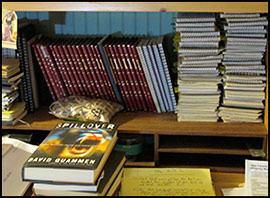
Field journals & notebooks
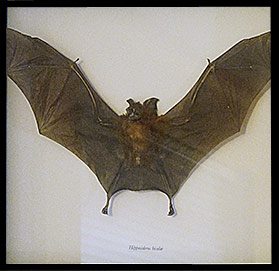
Hipposideros biocolor, probably from Indonesia.
